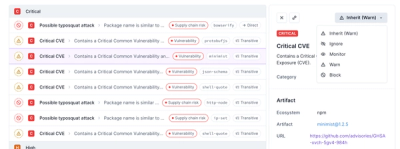
Research
Security News
Malicious npm Package Typosquats react-login-page to Deploy Keylogger
Socket researchers unpack a typosquatting package with malicious code that logs keystrokes and exfiltrates sensitive data to a remote server.
conventional-recommended-bump
Advanced tools
Package description
The conventional-recommended-bump npm package is a tool that analyzes conventional-style commit messages (like those used by AngularJS) to determine the type of version bump (major, minor, or patch) that should be recommended based on the changes made. It is often used in automated versioning and release workflows to ensure semantic versioning practices are followed.
Determining the type of version bump
This feature allows you to determine whether your next release should be a major, minor, or patch version. The code sample shows how to use the package with the Angular preset to get a recommendation.
const conventionalRecommendedBump = require('conventional-recommended-bump');
conventionalRecommendedBump({
preset: 'angular'
}, (error, recommendation) => {
console.log(recommendation.releaseType);
});Customizable preset options
This feature allows you to customize the preset options for analyzing commit messages. The code sample demonstrates how to specify a custom header pattern and correspondence for the Angular preset.
const conventionalRecommendedBump = require('conventional-recommended-bump');
conventionalRecommendedBump({
preset: 'angular',
config: {
headerPattern: /^\[(.*)\] (.*)$/,
headerCorrespondence: ['type', 'subject']
}
}, (error, recommendation) => {
console.log(recommendation.releaseType);
});Using a custom parser
This feature allows you to use a custom parser for commit messages. The code sample shows how to pass custom parser options to the package.
const conventionalRecommendedBump = require('conventional-recommended-bump');
const customParserOpts = require('./custom-parser-opts');
conventionalRecommendedBump({
parserOpts: customParserOpts
}, (error, recommendation) => {
console.log(recommendation.releaseType);
});semantic-release is an npm package that automates the versioning and package publishing process based on semantic versioning and conventional commit messages. It is more comprehensive than conventional-recommended-bump as it includes the entire release workflow, not just the recommendation for version bumps.
standard-version is an automated versioning tool that adheres to Semantic Versioning and uses conventional commit messages to determine version bumps. It is similar to conventional-recommended-bump but also handles the generation of changelogs and tagging of releases.
release-it is a generic CLI tool for automating versioning and package publishing. It supports conventional commits and can determine version bumps, but it also includes a wide range of release-related tasks, making it more versatile than conventional-recommended-bump.
Readme
Get a recommended version bump based on conventional commits
Got the idea from https://github.com/conventional-changelog/conventional-changelog/pull/29
$ npm install --save conventional-recommended-bump
var conventionalRecommendedBump = require('conventional-recommended-bump');
conventionalRecommendedBump({
preset: 'angular'
}, function(err, result) {
console.log(result.releaseType);
//=> 'major'
});
$ npm install --global conventional-recommended-bump
$ conventional-recommended-bump --help
Type: boolean Default: true
If true, reverted commits will be ignored.
Type: string Possible values: 'angular'
It's recommended to use a preset so you don't have to define everything yourself. Presets are names of built-in config.
Type: object
This should serve as default values for other arguments of conventionalRecommendedBump so you don't need to rewrite the same or similar config across your projects. Any value in this could be overwritten.
NOTE: options.config will be overwritten by the values of preset. You should use either preset or config, but not both.
Type: function
A function that takes parsed commits as argument.
This should return an object including but not limited to level and reason. level is a number indicating what bump it should be and reason is the reason of such release.
For backward compatibility, it could return a number indicating what bump it should be.
####### commits
Type: array
An array of parsed commits. The commits are from last semver tag to HEAD and is parsed by conventional-commits-parser.
If it returns with level 0 it will be a major bump. If 1, minor bump. If 2, patch.
Type: string
Specify a prefix for the git tag that will be taken into account during the comparison.
For instance if your version tag is prefixed by version/ instead of v you would specify --tagPrefix=version/
See the conventional-commits-parser docs.
Type: function
Object includes what's returned by whatBump and
####### releaseType
Type: string Possible values: 'major', 'minor' and 'patch'
The value of what it should release as.
MIT © Steve Mao
FAQs
Unknown package
The npm package conventional-recommended-bump receives a total of 1,197,242 weekly downloads. As such, conventional-recommended-bump popularity was classified as popular.
We found that conventional-recommended-bump demonstrated a healthy version release cadence and project activity because the last version was released less than a year ago. It has 4 open source maintainers collaborating on the project.
Did you know?

Socket for GitHub automatically highlights issues in each pull request and monitors the health of all your open source dependencies. Discover the contents of your packages and block harmful activity before you install or update your dependencies.

Research
Security News
Socket researchers unpack a typosquatting package with malicious code that logs keystrokes and exfiltrates sensitive data to a remote server.

Security News
The JavaScript community has launched the e18e initiative to improve ecosystem performance by cleaning up dependency trees, speeding up critical parts of the ecosystem, and documenting lighter alternatives to established tools.

Product
Socket now supports four distinct alert actions instead of the previous two, and alert triaging allows users to override the actions taken for all individual alerts.